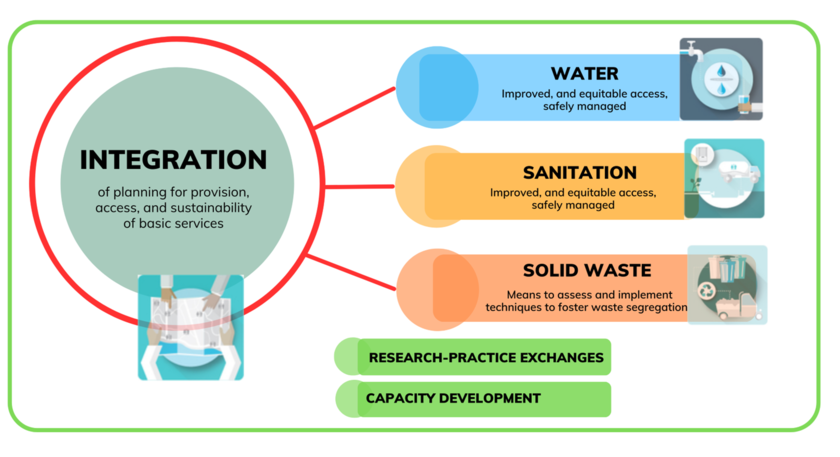Department Sanitation, Water and Solid Waste for Development
Water, Behavior Change and Environmental Sanitation: (WABES)

Water, Sanitation and Solid Waste are inherently linked by their service chains and often have negative interactions. For example, solid waste ends up clogging sewers, leading to leakages into water sources. Conversely, there is also scope for positive interactions between them, for example, reuse of treated wastewater for flushing or co-composting of fecal and organic wastes.
There is little research about interactions between these basic services and their planning processes, which are ill equipped to anticipate such interactions due to their siloed nature. This is the case especially in small towns and intermediate urban centers in Sub-Saharan Africa. This integration aspect of the project is being explored in two small towns in Uganda, in partnership with Makerere University.
In addition, several challenges still exist in the service chains of water, sanitation and solid waste management. Therefore, the project also has individual research dimensions of exploring knowledge gaps in the provision of these three basic services, including the development and testing of relevant tools and approaches.
These two opportunities are the basis for the four-year transdisciplinary research project WABES. The project builds on current research to investigate, validate and disseminate knowledge targeting the following outcomes:
- Improved and equitable access to safely managed water and environmental sanitation
- Integrated and inclusive planning methodology for water and waste services
- Accumulated and transferred knowledge outputs for students and practitioners to foster capacity improvement
To achieve these outcomes, the team intends to:
- Collaborate with in-country researchers and practitioners to identify, test, document and disseminate integrated water, sanitation and solid waste service approaches and innovations
- Reach out to the marginalized, poor and vulnerable while taking into account cross cutting issues including gender roles, equity and discrimination.
- Link research outputs to current policy and practice dialogues to achieve impact
- Develop and disseminate capacity building tools for target practitioners and tertiary learners
WABES is not only an avenue to develop new scientific knowledge but also disseminate the insights relevant to practitioners. These include planners, engineers, policy makers and financial institutions who have an interest in improving basic service provision in the many small towns in sub-Saharan Africa and beyond.
Please get in touch:
- The Principal Investigator and the Project Manager for general project queries.
- Scientific Knowledge Broker for practice-tailored insights based on this project.
- Research leads for specific research topics.
- Digital Learning lead for all capacity development queries.
Implementation period: 2022-2026
Funding: Eawag and Swiss Development Corporation (SDC)
